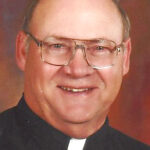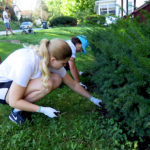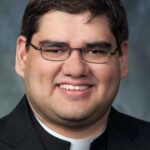
Catholics from a half-dozen parishes in our diocese learned recently how 13 federal policies have created and sustained gaps in wealth, income and hunger between white and Black Americans, and how this discrimination affects people of color nationwide.
Bread for the World’s (BFW) “Racial Wealth Gap Learning Simulation” deserves wider distribution in our parishes, schools, adult formation and youth ministry groups. BFW provides solid references to explain why racism is systemic. It permeates our society and is not simply a problem that persists among minorities, as some white people believe.
We learn about the pervasiveness of unequal treatment under government policies, institutions and social practices; the lack of equitable access to capital/credit; unpaid, underpaid or exploitative labor; and persistent lack of enforcement of civil rights, among other practices. We learn about the establishment of laws pertaining to housing, education and criminal justice, among others, that intentionally or indirectly relegated African Americans to second-class citizens.
Take, for example, the National Housing Act of 1934, which established the Federal Housing Administration to regulate interest rates and mortgage rates after the banking crisis of the Great Depression. That action led to “redlining” neighborhoods that were predominantly Black. Residents in these neighborhoods were considered a higher loan risk. Redlining is now prohibited, but its consequences have been long lasting.
Homeownership “is the primary way for American families of modest means to build wealth. African Americans have been denied equitable access to mortgage loans, and therefore, homeownership, for roughly the past four generations. Areas with a low rate of homeownership have fewer assets, equity and resources. Consequently, African American neighborhoods are far more likely than white neighborhoods to have areas of concentrated poverty…” (BFW Racial Wealth Gap).
A column in the Aug. 22 issue of the Quad-City Times illustrates the ongoing challenge of establishing fairness in lending. Debra Gore-Mann of The Greenlining Institute reports that two-thirds of home mortgages in the U.S. are underwritten by internet-based financial technology (fintech firms). “Because fintech lenders don’t have physical branches or take deposits, they aren’t subject to most federal and state regulations that govern banks. That opens the door to all sorts of risks and predatory practices, some of which particularly endanger communities of color and low-income borrowers, putting the whole economy at risk.”
Each of the 13 policies of the BFW Racial Wealth Gap learning simulation seem like the threads that a spider weaves into its web. School funding, for instance, is often “tied to the local property tax base, which is lower in most African American neighborhoods and other neighborhoods of color,” BFW reports. “There is currently a gap of up to $733 between what is spent per student per school year in schools with predominantly white students compared to schools with predominantly black students.”
Catholics have a duty to work to eradicate racism. The sin of racism warrants an examination of conscience, individually and collectively. Today’s disparities can be traced to past and present discrimination through careful examination of our national policies and their impact on people of color.
We should broaden our perspective by reading. A letter writer in this week’s issue, Gale Francione, recommends Father Bryan Massingale’s book “Racial Justice and the Catholic Church” as a good starting point. Father Massingale is a Black theologian with a lifetime of experience. His love for the Catholic Church compels him to educate and inspire Catholics to confront racism and to work to eradicate it.
Earlier this year, Jim Collins, a parishioner at Sacred Heart Cathedral in Davenport, shared a message with The Catholic Messenger that bears repeating: “While we all work to level the ‘playing field,’ we have to work towards assuring the dignity of all.”
We begin with a willingness to learn and listen:
• Ask your parish, Bible study, school or civic group to participate in the Racial Wealth Gap learning simulation. Download it at bread.org\simulation. Watch the facilitator’s video and read the facilitator’s guide.
• Have a conversation with other people on issues of race. Learn about their history.
• Collaborate with a sister church of another race/culture.
• Evangelize to integrate our church.
• Pray for and support programs that boost housing, education, job opportunities and voting rights for all citizens. Join the St. Martin de Porres Society, open to all the faithful in our diocese. Contact thomasmason1928@gmail.com for more information.
• Visit the “Response to Racism” page on the Diocese of Davenport website (https://www.davenportdiocese.org/racism).
• Visit the resource page from the USCCB Ad Hoc Committee on racism: https://www.usccb.org/resources/action-steps-to-eradicate-racism.pdf
• Work with other people of faith to help address racism in Iowa; for example, the Interfaith Alliance of Iowa offers a number of resources and ways to get involved
(https://faithful-voices.org/).
Together, we can close the gap so that all of us, whatever our race, can prosper as we work together to build up the body of Christ.
Barb Arland-Fye, Editor
arland-fye@davenportdiocese.org











